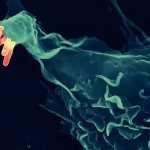Link to Pubmed [PMID] – 26123804
Infect. Immun. 2015 Sep;83(9):3624-37
Intracellular pathogens are differentially sensed by the compartmentalized host immune system. Nevertheless, gene expression studies of infected cells commonly average the immune responses, neglecting the precise pathogen localization. To overcome this limitation, we dissected the transcriptional immune response to Shigella flexneri across different infection stages in bulk and single cells. This identified six distinct transcriptional profiles characterizing the dynamic, multilayered host response in both bystander and infected cells. These profiles were regulated by external and internal danger signals, as well as whether bacteria were membrane bound or cytosolic. We found that bacterial internalization triggers a complex, effector-independent response in bystander cells, possibly to compensate for the undermined host gene expression in infected cells caused by bacterial effectors, particularly OspF. Single-cell analysis revealed an important bacterial strategy to subvert host responses in infected cells, demonstrating that OspF disrupts concomitant gene expression of proinflammatory, apoptosis, and stress pathways within cells. This study points to novel mechanisms through which bacterial internalization, localization, and injected effectors orchestrate immune response transcriptional signatures.

